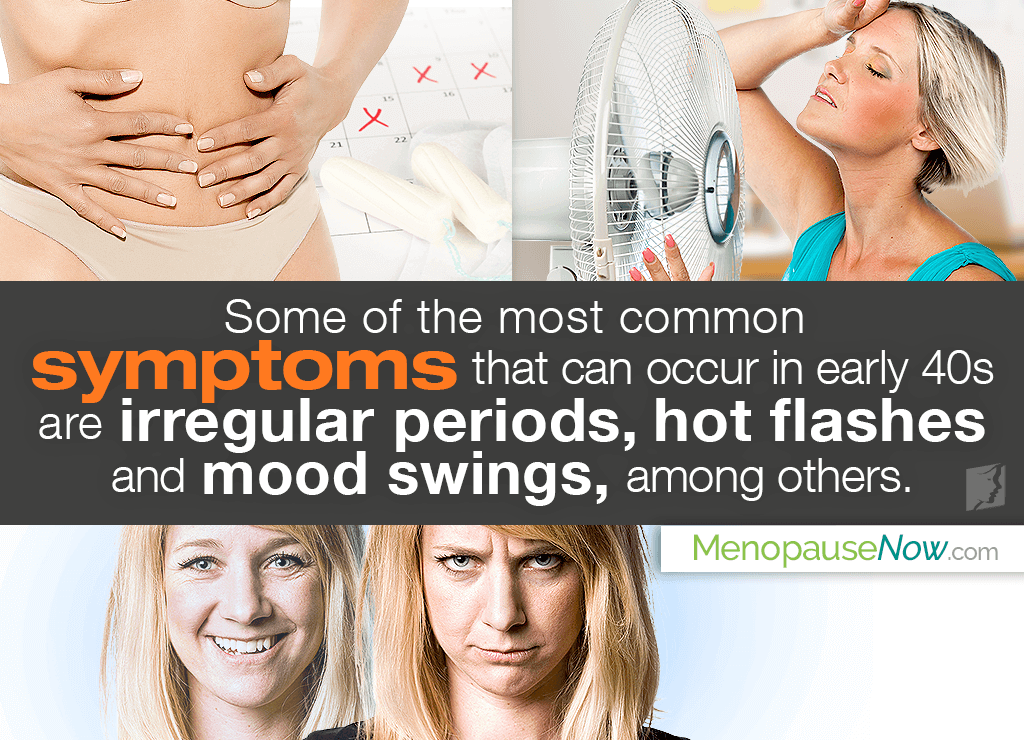Menopause can be a turbulent time for many women, marking the beginning of the end to their fertile years, a new chapter of their lives, and the appearance of bothersome menopause symptoms. Continue reading to learn about symptoms of menopause in early 40s, including what can be done for symptom relief and ultimate comfort.
What Stage Am I In?
Women usually enter perimenopause, a transitional stage that occurs before menopause, in their early and mid-40s. Though medically known as perimenopause, the stage is colloquially known as menopause.
Perimenopause may last for up to a decade before menopause has been declared.1 Since the average age of menopause in the United States is 51, this technically means the transition could begin once a woman is in her early 40s.2
In perimenopause, hormonal fluctuations of estrogen and progesterone start to take place as a woman's eggs run out, and ovarian reproductive functions begin to wind down. This can trigger abrupt physical and psychological effects in a woman's body that may be distinct from premenstrual syndrome (PMS) symptoms.
Symptoms of Menopause in Early 40s
Some of the most distinctive symptoms of menopause in early 40s include:
Irregular periods
Irregular periods are often what women notice first as they start approaching mid-life. They are characterized by menstrual cycles that are longer or shorter than normally with heavier or lighter periods, among other characteristics.
Hot flashes
Around 75 percent of perimenopausal women suffer from this hallmark symptom of menopause.3 Hot flashes vary in intensity and frequency, but when they strike, they often leave women flushed and drenched from increased perspiration from the neck up.
Night sweats
Night sweats are the nocturnal version of hot flashes. So, if suffering from both at the same time, it is not uncommon for women to wake up in the middle of the night with soaked bed sheets and pajamas, feeling they cannot find escape from these pesky symptoms.
Mood swings
Also a hallmark menopause symptom, mood swings are drastic changes in temper that are seemingly unrelated to outside triggers. Aside from hormones, they can also be attributed to or worsened by the stress of aging and changing roles.
Trouble concentrating
Worsening of memory and other cognitive challenges, such as difficulty concentrating, are commonly reported by menopausal women. They are found to be more prevalent early in the menopause transition. It is said that almost three quarters report some form of memory impairment.4
Reminders
All or almost all symptoms are likely to continue for months or years as women move throughout the various stages of the menopause transition, from perimenopause to menopause to postmenopause.
As a matter of fact, menopause symptoms in late 40s and early 50s can appear or endure when the hormonal flux continues, hormone levels are continuously dropping, and proper management has not been instilled.
It is essential that women remember that any menopause symptom can be treated by taking the proper initiative to tackle the underlying cause, hormonal imbalance. Natural and effective menopause symptom treatments are designed to promote optimal endocrine health for physical and psychological stability well into a woman's twilight years.
Sources
- Harvard Health Publishing. (2018). Perimenopause: Rocky road to menopause. Retrieved October 29, 2019, from https://www.health.harvard.edu/womens-health/perimenopause-rocky-road-to-menopause
- Mayo Clinic. (2017). Menopause: Symptoms & causes. Retrieved October 29, 2019, from https://www.mayoclinic.org/diseases-conditions/menopause/symptoms-causes/syc-20353397
- National Institute on Aging. (2017). What Are the Signs and Symptoms of Menopause? Retrieved October 29, 2019, from https://www.nia.nih.gov/health/what-are-signs-and-symptoms-menopause
Footnotes:
- Cleveland Clinic. (2019). Menopause, Perimenopause and Postmenopause. Retrieved October 29, 2019, from https://my.clevelandclinic.org/health/diseases/15224-menopause-perimenopause-and-postmenopause
- The North American Menopause Society. (n.d.). Are We There Yet? Navigate Now with Our Guided Menopause Tour. Retrieved October 29, 2019, from https://www.menopause.org/for-women/menopauseflashes/menopause-symptoms-and-treatments/are-we-there-yet-navigate-now-with-our-guided-menopause-tour
- John Hopkins Medicine. (n.d.). Introduction to Menopause. Retrieved October 29, 2019, from https://www.hopkinsmedicine.org/health/conditions-and-diseases/introduction-to-menopause
- Santoro, N. et al. (2015). Menopausal Symptoms and Their Management. Endocrinology and Metabolism Clinics of North America, 44(3), 497-515. doi: 10.1016/j.ecl.2015.05.001




